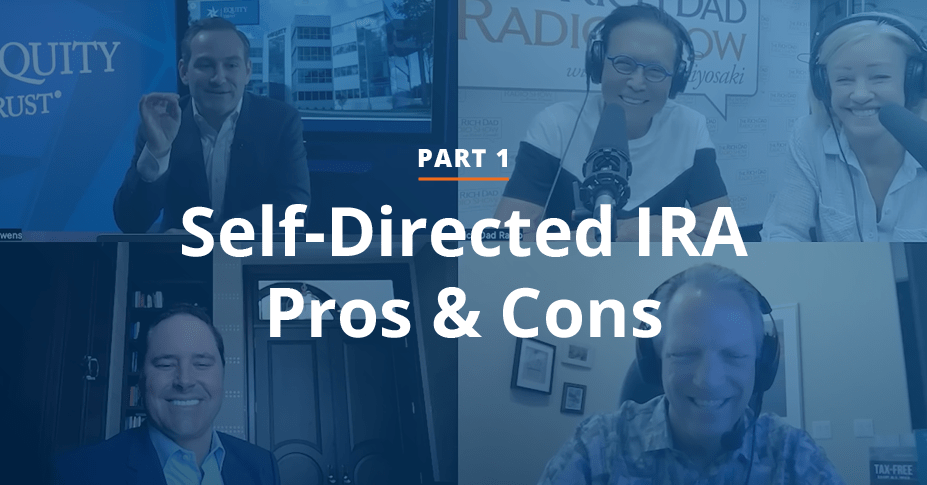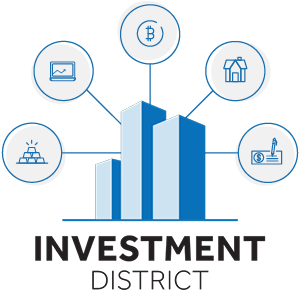Robert: Yeah. John, I highly recommend people talk to you, but also talk to people like Tom. We’re an education company. We’re not a recommendation company. So, Tom, you were talking about a Roth IRA.
Tom: A Roth IRA is different because you don’t get a tax deduction going in and you don’t pay tax coming out. So, if you were going to do real estate in an IRA, you would want to do it in a Roth IRA, by definition. If you want to maximize your leverage or your debt on your real estate, then that is a challenge in an IRA because it cannot be recourse debt.
In other words, you can’t be personally liable on that debt. That’s called a prohibited transaction and your IRA’s done. You must recognize the limitations. So, it’s really those two things, leverage, and depreciation, that you lose in the Roth.
Robert: Yeah. I’m glad you guys are listening to this program. I’m glad to have Jeff and John on, because this is what we are: an education company. But to me, the big thing is, are you going to be an active investor or passive? If you’re passive and you really don’t want to do all the study, then Jeff and John are probably pretty good. Right, Tom?
Tom: I agree. So, where I see people investing in a self-directed Roth IRA, for example, a doctor who doesn’t have any time, doesn’t want to get any (investment) education, but wants to invest in a syndicated deal. Then, they might do that within an IRA because, for whatever reason, their accountant hasn’t figured out how they could get the depreciation. And so, they’ve decided, well, that’s not important to them. If the tax benefits are important, then that’s a challenge within an IRA because you lose the benefits.
Robert: There’s one more thing about being professional investors and that thing is called management. And most people suck at management. That’s why their employees are self-employed. You’ve really got to be proactive in this whole thing. I was just down in Bisbee, Arizona, managing our property which takes a lot of time. It does.
So, John, you educate people about Roth IRAs, self-directed IRAs, all of that. What do you see as the biggest pros and cons?
Self-Directed IRA pros and cons
John: Yeah, absolutely. I appreciate the healthy debate here between owning real estate inside of an IRA and outside of an IRA. As head of education here (Equity Trust), I’m also an active real estate investor.
My wife and I own real estate inside and outside of a self-directed IRA. Every time we approach a real estate opportunity, it could be an actual property. It could be a real estate partnership. It could be a private loan secured by real estate. One of the things that my wife and I do quite a bit of is we find borrowers. We find real estate flippers that need financing, and they don’t want to go to the hard money loan folks. They don’t want to pay the higher interest rates.
So, they come to private money lenders like us. And when we see those types of opportunities, those are great opportunities for our self-directed traditional IRAs and our self-directed Roth IRAs because when you make a loan with your IRA money, all the interest income is tax exempt in that retirement plan.
If I make a loan without my self-directed IRA, then I’m going to pay ordinary income taxes on that profit. But if I use my self-directed traditional or my self-directed Roth IRA, all that profit is tax-free. So, my philosophy and the way that I coach and educate investors is don’t be thinking about doing every single transaction inside of your self-directed IRA. You want to be thinking about how you can do them inside and outside of your self-directed IRA.
The key here is this is for folks that have IRAs and 401(k)s and other retirement plans, and they’re tired of the limited options where they can only invest in the traditional financial markets. The timing couldn’t be better for this podcast because when we look at the SP 500, at the time of recording, we’re down about 17 percent.
So, there are hundreds of investors that are reaching out to us daily that are looking for an escape route. They’re looking for a way to invest in Main Street instead of Wall Street. One of the things that we do here at Equity Trust is we educate folks on the things that you can do with a self-directed IRA and how to do them effectively, and the things that you want to make sure you stay away from.
Kim: I want to go to Jeff because it’s getting all about real estate and it’s a good, healthy debate. I like that. But there’s also other things like gold and silver. Does it make sense to put that into an IRA? I’d like to hear from Jeff and from Tom.
Jeff: Sure. I would like to echo what John just said. The real power of these accounts is the flexibility and Robert, you made a good point. If you’re going to be an active investor, you need to be involved. If you’re going to take a passive route, you can go that way as well with one of these accounts. Precious metals such as gold, platinum, and silver, is something that’s very popular. We open tens of thousands of accounts a year and hold billions of dollars in precious metals.
Robert: Are you also a storage facility?
Jeff: We use a couple of different places where you can store the metals and the client can choose where among our options that they want to store their precious metals.
Robert: My dad often said there’s a million ways to go to financial heaven and a billion ways to go to financial hell. That’s why we’re having this Rich Dad Radio Show today. I’m glad you guys are on board, and it really depends upon you as the investor. Who do you listen to? Who do you talk to? That’s why we’re happy you’re all listening in to this one because there’s so many different people offering different services. And if you don’t know the difference, they all look the same.
Kim: Tom’s got some words to a counterpoint. Go ahead, Tom.
Tom: So, two things. First, to John’s point, when I talk about not putting real estate into an IRA, I’m talking about the actual investment real estate, not a loan. So, I agree with you, John. If you’re lending money inside an IRA, that’s a great place to hold those loans. If that’s part of your investment track, that totally makes sense from a tax standpoint. So, I totally agree with you.
On precious metals, the big concern right now is storage. You cannot store it in your basement anymore, which I think might be why Robert’s asking where you store it?
Kim: What is the rule on storing?
Tom: You can’t have control over it, so you can’t store it at your home. You can’t store it under your mattress. You can’t put it there. That was the recent court ruling. They were very clear on it, and it caused a big problem for this IRA investor. And so, you must have a storage facility someplace where you don’t have ready access to it.
John: That’s a great point. I should mention that as a self-directed IRA custodian, we have $3.5 billion in precious metals under custody, and these are held at licensed and bonded depositories.
At Equity Trust, we’ve built an entire ecosystem for folks that want to use their IRAs to invest in precious metals. From identifying a dealer they can purchase from, to storing the physical metals. We do not allow customers to utilize what’s called a checkbook LLC IRA, which is exactly what Tom was talking about.
That’s the McNulty case, November of 2021. Really glad you brought that up, Tom, we are absolutely on the same page in terms of not allowing investors to take advantage of potential loopholes, because you saw exactly what happened in the case of McNulty, they tried to use a loophole and they ended up creating a prohibited transaction.
That goes back to our philosophy here at Equity Trust and providing good education and information to investors so that they can make informed decisions, whether it’s real estate, precious metals, private lending investments in private placements, digital currency, and other alternative assets. It goes beyond just the traditional financial markets. Our goal is to help investors take more control of their retirement savings and be able to invest in asset classes that they know, like, and trust.
Robert: Good. I want to get Tom in as much as possible as we’re not pumping Equity Trust. I’m glad you guys are here. I’m glad you’re here to educate, which is our primary job at the Rich Dad Company. It’s good to make people aware that there are options out there. Any other comments?
Checkbook IRAs vs. Self-Directed IRAs
Tom: Yeah. I’m glad you guys don’t use checkbook IRAs. I really don’t like checkbook IRAs. The problem with that is that it’s too easy to make a mistake. You want to make sure that your custodian has all their “I’s” dotted and their “T’s” crossed because with a checkbook IRA, I think you can make a lot of mistakes. It’s easy to blow up your IRA. I think there are instances were using IRAs for a certain type of investment makes sense. I think the key is to understand what type of investments work well in an IRA and what type of investments don’t work well in an IRA.
Robert: What is a checkbook IRA?
Tom: So, basically, a checkbook IRA is when you’re the manager of the limited liability company that is owned by your IRA. So, the owner of your limited liability company is the IRA, but you get to write checks on that limited liability company’s bank account. Basically, you end up with too much control. It’s not that they’re illegal. It’s just easy to make a mistake.
Robert: Thank you.
Kim: Tom, as people are looking at IRAs and working with different companies, what are one or two questions that are important for people to ask?
Tom: I would ask them: How do you feel about the checkbook IRA? I think that’s a very important one.
Jeff: We’re one of the few firms that have really stood strong on this.
Tom: That is important because there are a lot that promote it. I don’t like that. I think the other question would be help me understand what types of investments work, what types don’t. I would also make sure that you’re talking to your tax advisor. Don’t be talking to one person without the other. Always make sure your tax advisor is involved because they are working for you. They’re only working for you. They’re the ones that you really need to rely on. Then they can talk to Equity Trust as well. Just like you have me to interpret things for you. Everyone should utilize their tax advisor as that person to interpret.
Robert: Thank you. Sixty percent of Americans don’t have $1,000 to their name, and they don’t have a tax advisor either. That’s why I have the Rich Dad Radio Show. Tom, thank you very much. When we come back, we’ll be completing with Jeff and John, and we’ll find out more about what they do.
Read Part 2 of the interview to hear Jeff, John, Robert, and Kim discuss common mistakes investors make with self-directed accounts, what investors should watch out for regarding scams, the importance of financial education, and how to contact us.
1Can I roll over a 401(k) account into a self-directed IRA?
Yes. A self-directed IRA gives you the ability to diversify your portfolio with additional investments that are permitted by the IRS, in a tax-free or tax-deferred environment.
2When I roll over funds from an employer-sponsored or qualified retirement plan, do they need to go directly into a traditional IRA?
No. Per IRS guidelines, rollovers from a qualified plan can be rolled over into a traditional or Roth IRA. If the rollover is made directly to the Roth IRA, the transferred amount is subject to income taxation but avoids the 10-percent early distribution penalty. You should consult with your plan administrator regarding the permissible withdrawal options allowed under the tax-qualified plan.
the Rich Dad Podcast and owners of named publications are not affiliated with Equity Trust Company. Opinions or ideas expressed are not necessarily those of Equity Trust Company nor do they reflect their views or endorsement. These materials are for educational and informational purposes only. Equity Trust Company, and its affiliates, representatives and officers do not provide legal or tax advice. Investing involves risk, including possible loss of principal. Whenever making an investment decision, please consult with your tax attorney or financial professional.








